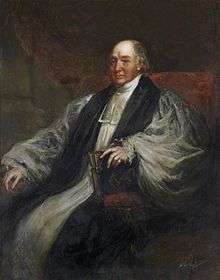James Monk (bishop)
| The Right Reverend James Monk | |
|---|---|
| Bishop of Gloucester and Bristol | |
 James Henry Monk by Richard Buckner | |
| Diocese | Diocese of Gloucester and Bristol |
| In office | 1836–1856 |
| Predecessor |
Himself as Bishop of Gloucester |
| Successor | Charles Baring |
| Other posts |
Dean of Peterborough (1822–1830) Bishop of Gloucester (1830–1836) |
| Personal details | |
| Born | 12 December 1784 |
| Died | 6 June 1856 (aged 71) |
| Buried | Westminster Abbey |
| Nationality | British |
| Denomination | Anglican |
| Spouse | Jane Hughes |
| Education |
Norwich School Charterhouse School |
| Alma mater | Trinity College, Cambridge |
James Henry Monk (12 December 1784 – 6 June 1856) was an English divine and classical scholar.
Life
He was born at Buntingford, Hertfordshire. He was educated at Norwich School, Charterhouse School and Trinity College, Cambridge, and in 1809 was elected Regius Professor of Greek in succession to Porson.[1] The establishment of the classical tripos was in great measure due to his efforts. In 1822 he was appointed Dean of Peterborough; in 1830, bishop of Gloucester (with which the see of Bristol was amalgamated in 1836).
Works
He is best known as the author of a Life of Bentley (1830) and as the editor (with CJ Blomfield) of Porson's Adversaria (1812).
References
- ↑ "Monk, James Henry (MNK799JH)". A Cambridge Alumni Database. University of Cambridge.
 This article incorporates text from a publication now in the public domain: Chisholm, Hugh, ed. (1911). "article name needed". Encyclopædia Britannica (11th ed.). Cambridge University Press.
This article incorporates text from a publication now in the public domain: Chisholm, Hugh, ed. (1911). "article name needed". Encyclopædia Britannica (11th ed.). Cambridge University Press.
External links
- Works by or about James Monk in libraries (WorldCat catalog)
| Church of England titles | ||
|---|---|---|
| Preceded by Thomas Kipling |
Dean of Peterborough 1822–1830 |
Succeeded by Thomas Turton |
| Preceded by Christopher Bethell |
Bishop of Gloucester 1830–1836 |
Succeeded by Himself as Bishop of Gloucester and Bristol |
| Preceded by Himself as Bishop of Gloucester Joseph Allen as Bishop of Bristol |
Bishop of Gloucester and Bristol 1836–1856 |
Succeeded by Charles Baring |
This article is issued from Wikipedia - version of the 10/11/2016. The text is available under the Creative Commons Attribution/Share Alike but additional terms may apply for the media files.